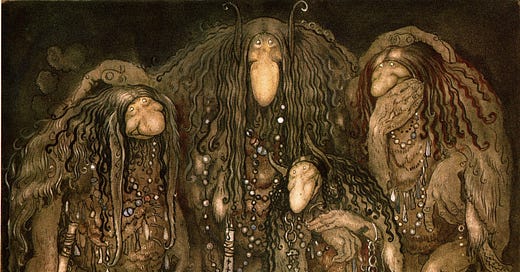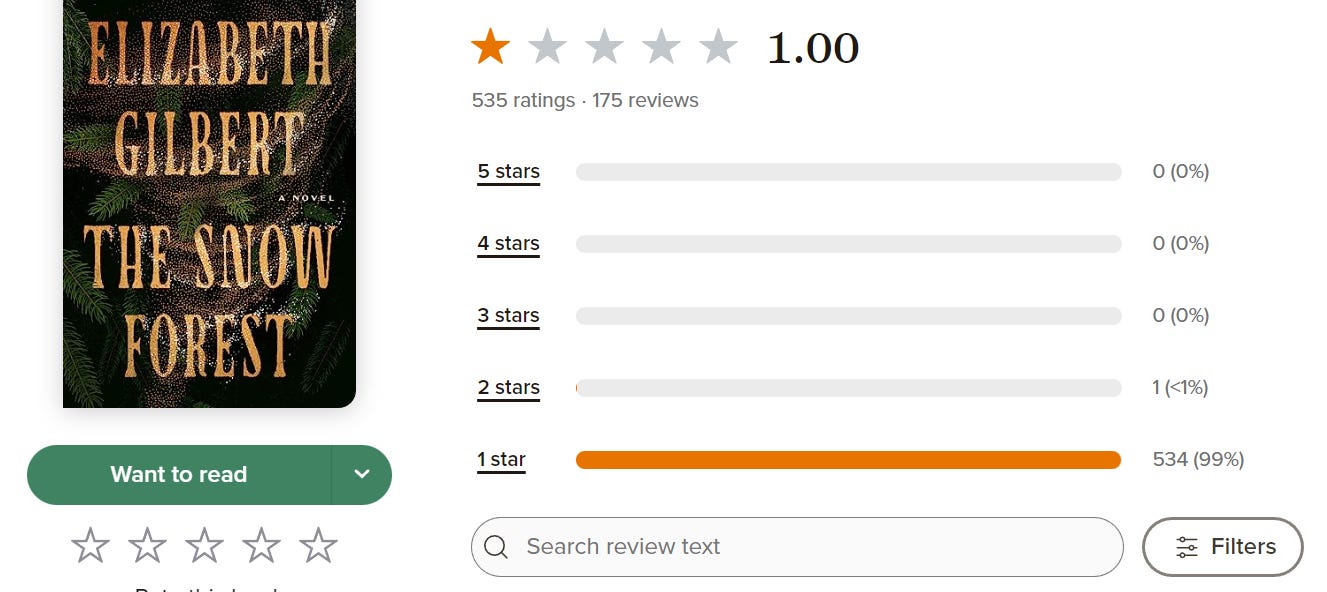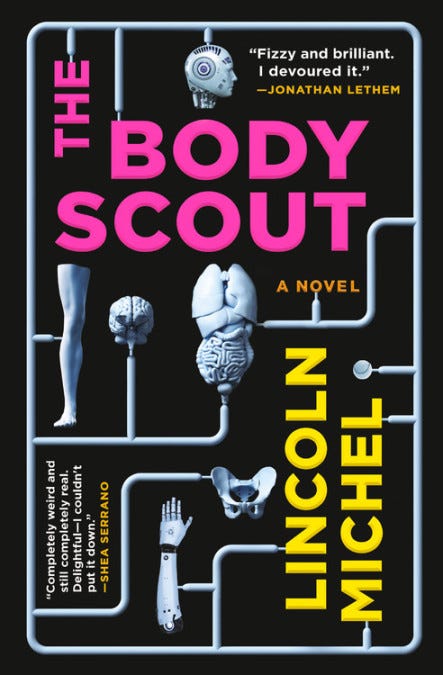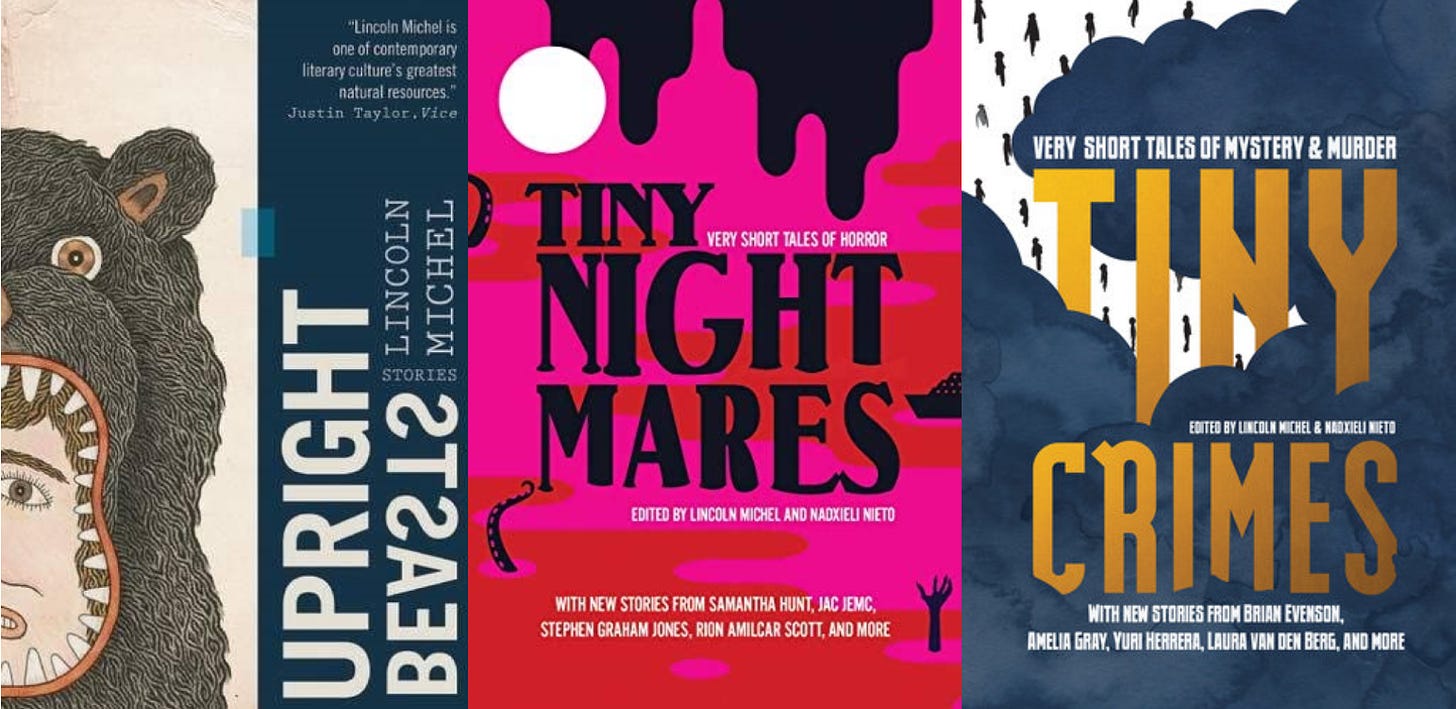Goodreads Has No Incentive to be Good
Goodreads is full of trolls, spam, and harassment campaigns. They probably like it that way.
When I was getting my start as a writer, there was a mildly infamous Amazon troll who left one-star reviews on every book in the indie lit scene. (“Indie” then meant published on small literary presses not self-published on Amazon.) Seemingly a failed writer, he took his frustrations out on authors he’d never met or even read. His “reviews” didn’t even pretend to review the books. Most were poorly written poetry akin to “night sky / smeared with poo poo / mosquito my pee hole? / words r dumb.”
But the fact this troll hadn’t even pretended to read the books didn’t matter, because what mattered was the ratings.
Few people read reviews whether it is Amazon, Yelp, or anywhere else. But shoppers look at ratings. Even worse, Amazon factors ratings into its algorithm meaning bad ratings could directly impact your sales. Back then, everyone tried to rig the rating. Authors would beg friends or family members to leave five-star reviews while haters would one-star their nemeses or authors who annoyed them on Twitter. It was all very stupid in the typical way of social media, but it mattered since Amazon was—and still is—a huge percentage of the book market.
At some point, Amazon wised up. They began moderating reviews, removing spam, and boosting “verified” reviews from users who bought the book via the site. I imagine this had nothing to do with books. It was probably Amazon realizing companies were spamming reviews of their products (positively) and their rivals’ products (negatively) to the degree the site was becoming unusable. So they fixed it, at least a bit. Amazon reviews are harder to rig positively or negatively these days.
Yet despite the fact that Amazon has cleaned up their own reviews, they’ve done essentially nothing to moderate Goodreads, a site they purchased a decade ago. Goodreads is now the prime site of book spam, trolls, and harassment campaigns. In fact, the other day I was on the site—like many I use it to log my reading, although I avoid writing reviews—and found a one-star “review” from the old Amazon troll. He’d found his new home in Goodreads.
Goodreads Bad Review Campaigns
Today the New York Times has a piece on Goodreads and the problem with review bombings. I spoke to one of the reporters and am quoted briefly. I thought I’d expand my thoughts a bit here. The NYT piece focuses on one-star review campaigns that have tanked books or event gotten them canceled or pulled. This is in the news now thanks to bestselling author Elizabeth Gilbert choosing to delay a forthcoming novel that got bombarded with negative reviews long before it was even in galley form. The page is down now, but here’s what it looked like when Gilbert decided to pull the publication:
The supposed problem here was the fact that Gilbert’s historical novel is set in Russia—or rather the USSR—and some ostensibly Ukrainian readers decided the book glorified Russia and it was offensive to publish during the ongoing war. Gilbert has every right to control the publication of her own work, and I have no time for people who think Putin’s far-right and plutocratic regime’s imperialist invasion of Ukraine is defensible at all. But the cancellation of The Snow Forest is a good example of how weird these harassment campaigns can get. None of the one-star reviewers had read Gilbert’s book, which was slated for a 2024 release. The novel’s description said it was about a family resisting the Soviet regime in the 1930s, so presumably not a glorification of Russia historically much less of Putin’s regime in 2023. The reviews had similar language indicating it was a somewhat organized campaign rather than organic reader displeasure. Nevertheless, the book was pulled.
The NYT article covers some other harassment campaigns, which—I would stress—run the gamut politically. Sometimes it is conservatives attacking a trans author for existing. Other times it is liberal reviewers objecting to a novel’s allegedly offensive premise. But in most of these cases the campaigns are about books no one has actually read.
The reviews of non-existent books aren’t limited to harassment campaigns. Fans will five-star books well before publication too. George R. R. Martin’s long-delayed sixth A Song of Ice and Fire novel has nearly 11,000 mostly five-star ratings and the seventh novel—which probably won’t appear for a decade if it’s ever even written—has over 2,000 ratings. While it’s nice for Martin that his fans have preemptively praised books he hasn’t finished, surely it doesn’t help readers to have a site full of inaccurate reviews.
Recently on Twitter, I suggested Goodreads shouldn’t allow reviews of books that aren’t published or at least not even in galley forms and got a couple angry responses telling me I must not know anything about publishing since it is “vital” for authors to “build buzz” by getting their fans and friends to review their books before they’re finished. Well, to the extent that’s true I would say that also seems bad!
While legitimate readers are prone to dumb reviews—even the most celebrated and accomplished works of literature have plenty of one-star complaints—shouldn’t we at a minimum want reviews by people who have at least read the work? Why does Goodreads allow reviews of books that no one has read?
Goodreads Cares about Engagement Not Accuracy
I think the fundamental problem with Goodreads is the same of social media in general: they care about engagement not accuracy.
Just as Twitter is happy to be filled with ragebait trolls and Facebook is fine being flooded with misinformation that generates engagement, Goodreads is presumably happy to have fake reviews. Hell, what better way to get engagement than having one-star review campaigns provoke fan campaigns to bring up the rating and so on and so forth. The more clicks the better.
And all the problems of social media in general are present with Goodreads and as much as people talk about the “Goodreads community” social media sites aren’t separate realms. Were the one-star Gilbert reviewers regular members of the Goodreads community? I doubt it. Review bombings can be conduced by anyone. Maybe you annoy fans of a rival sports team while Tweeting about baseball or catch the attention of trolls who disagree with your politics on Facebook and they one-star you in retaliation. And plenty of authors also behave badly with Goodreads, sometimes putting random reviewers on blast for negative reviews or even “negative” ones. There has been more than a few instances of authors attacking Goodreads users for giving their books “only” four stars (which of course prompted one-star review bombing retaliations by Goodreads users who hadn’t read the books).
There’s plenty that Goodreads could do to stop these problems. Moderation is obviously possible, as Amazon—again, the owner of Goodreads—has proved on their own site. An easy fix to the harassment campaigns would be not allowing reviews, or hiding display of reviews, until publication. Perhaps you change that to a set time (3 months?) before publication to allow for legitimate reviews by critics with advanced copies. This wouldn’t prevent someone reviewing a book they haven’t read, but it would limit the ability to get a book preemptively cancelled at least. There are many other things Goodreads could easily do. But until users start to leave the site, Goodreads has no incentive to change.
Ignore Goodreads as Best as You Can
All of this is of course extremely stressful for authors, especially marginalized authors or smaller authors who don’t have fans to go and defend them. (Although as Gilbert shows, even the most famous authors aren’t immune.) It’s especially frustrating because authors are increasingly tasked with doing the majority of publicity for their books, which often means being active on social media where you are constantly at risk of running afoul of bad faith actors.
For authors, it feels like there are no good options.
Since I don’t expect Goodreads to change, I’ll just repeat the classic advice: ignore Goodreads and for god’s sake don’t read your reviews! One-star harassment campaigns are a real threat that can tank or cancel books, as the NYT article shows. But, if you are lucky enough to avoid one then I’m not sure Goodreads matters nearly as much as most authors fear. Barnes and Noble isn’t deciding how many copies to order based on advanced Goodreads ratings. Indie bookstores aren’t basing table placement on them. I don’t even think Amazon factors them into their algorithm. If you beg friends to five-star you and successfully bump your rating from say 3.52 to 3.76 or if you piss off some people online who one-star you to drop your book from 3.76 to 3.52, is either of those things really going to substantially affect your book sales?
Probably not. And hopefully not. Because until Goodreads feels pressure to change, there’s nothing we authors can do.
If you like this newsletter, consider subscribing or checking out my recent science fiction novel The Body Scout that The New York Times called “Timeless and original…a wild ride, sad and funny, surreal and intelligent.”
Other works I’ve written or co-edited include Upright Beasts (my story collection), Tiny Nightmares (an anthology of horror fiction), and Tiny Crimes (an anthology of crime fiction).








Publishers need to sign on to this, too, because so many marketing campaigns include Goodreads giveaways. Goodreads doesn’t have a quantifiable effect on sales. Doing giveaways there is really another bullet point publishers can show authors so they (the publisher) can say “We did this for your book!”
This might seem simplistic at first glance, but I believe the solution to this phenomenon is for these sites to abandon the idea of star ratings altogether. I can't be the only person who values reviews because they reflect a person's emotional and intellectual engagement with the material; the interesting part is in the engagement itself not some clunky consumer guide system that's absent all nuance.